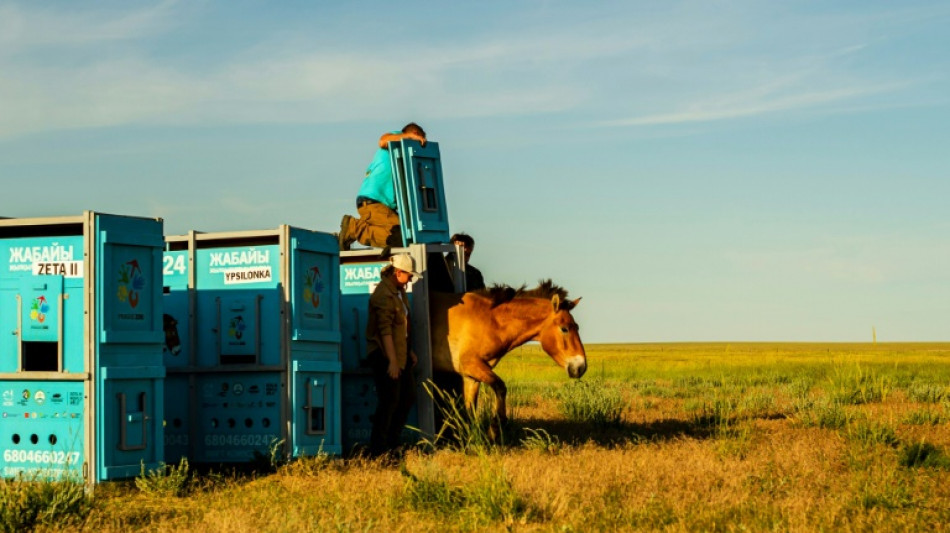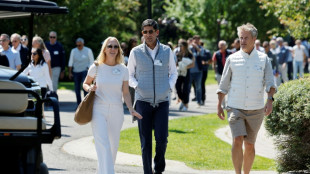
-
 Dutch PM-elect Jetten says not yet time to talk to Putin
Dutch PM-elect Jetten says not yet time to talk to Putin
-
Social media fuels surge in UK men seeking testosterone jabs

-
 Forest face Fenerbahce, Celtic draw Stuttgart in Europa League play-offs
Forest face Fenerbahce, Celtic draw Stuttgart in Europa League play-offs
-
US speed queen Vonn crashes at Crans-Montana, one week before Olympics

-
 Trump nominates former US Fed official as next central bank chief
Trump nominates former US Fed official as next central bank chief
-
New Dutch government pledges ongoing Ukraine support

-
 Newcastle still coping with fallout from Isak exit, says Howe
Newcastle still coping with fallout from Isak exit, says Howe
-
Chad, France eye economic cooperation as they reset strained ties

-
 Real Madrid to play Benfica, PSG face Monaco in Champions League play-offs
Real Madrid to play Benfica, PSG face Monaco in Champions League play-offs
-
Everton winger Grealish set to miss rest of season in World Cup blow

-
 Trump brands Minneapolis nurse killed by federal agents an 'agitator'
Trump brands Minneapolis nurse killed by federal agents an 'agitator'
-
Arteta focuses on the positives despite Arsenal stumble

-
 Fijian Drua sign France international back Vakatawa
Fijian Drua sign France international back Vakatawa
-
Kevin Warsh, a former Fed 'hawk' now in tune with Trump

-
 Zverev rails at Alcaraz timeout in 'one of the best battles ever'
Zverev rails at Alcaraz timeout in 'one of the best battles ever'
-
Turkey leads Iran diplomatic push as Trump softens strike threat

-
 Zelensky backs energy ceasefire, Russia bombs Ukraine despite Trump intervention
Zelensky backs energy ceasefire, Russia bombs Ukraine despite Trump intervention
-
'Superman' Li Ka-shing, Hong Kong billionaire behind Panama ports deal

-
 Skiing great Lindsey Vonn crashes at Crans-Montana, one week before Olympics
Skiing great Lindsey Vonn crashes at Crans-Montana, one week before Olympics
-
Slot warns Liverpool 'can't afford mistakes' in top-four scrap

-
 Paris show by late Martin Parr views his photos through political lens
Paris show by late Martin Parr views his photos through political lens
-
Artist chains up thrashing robot dog to expose AI fears

-
 Alcaraz outlasts Zverev in epic to reach maiden Australian Open final
Alcaraz outlasts Zverev in epic to reach maiden Australian Open final
-
French PM forces final budget through parliament

-
 French-Nigerian artists team up to craft future hits
French-Nigerian artists team up to craft future hits
-
Dutch watchdog launches Roblox probe over 'risks to children'

-
 Trump brands Minneapolis nurse shot dead by federal agents an 'agitator'
Trump brands Minneapolis nurse shot dead by federal agents an 'agitator'
-
Israel says killed 'three terrorists' in Gaza

-
 After Trump-fueled brawls, Canada-US renew Olympic hockey rivalry
After Trump-fueled brawls, Canada-US renew Olympic hockey rivalry
-
Eileen Gu - Olympic champion who bestrides rivals US, China

-
 Trump, first lady attend premier of multimillion-dollar 'Melania' documentary
Trump, first lady attend premier of multimillion-dollar 'Melania' documentary
-
US Senate eyes funding deal vote as government shutdown looms

-
 Cuddly Olympics mascot facing life or death struggle in the wild
Cuddly Olympics mascot facing life or death struggle in the wild
-
UK schoolgirl game character Amelia co-opted by far-right

-
 Anger as bid to ramp up Malaysia's football fortunes backfires
Anger as bid to ramp up Malaysia's football fortunes backfires
-
Panama court annuls Hong Kong firm's canal port concession

-
 Pioneer African Olympic skier returns to Sarajevo slopes for documentary
Pioneer African Olympic skier returns to Sarajevo slopes for documentary
-
Trump threatens tariffs on nations selling oil to Cuba

-
 From fragile youngster to dominant star, Sabalenka chases more glory
From fragile youngster to dominant star, Sabalenka chases more glory
-
Lowly Montauban 'not dead' in French Top 14 survival hunt

-
 'Winter signing' Musiala returns to boost weary Bayern
'Winter signing' Musiala returns to boost weary Bayern
-
Elena Rybakina: Kazakhstan's ice-cool Moscow-born Melbourne finalist

-
 Power battle as Sabalenka clashes with Rybakina for Melbourne title
Power battle as Sabalenka clashes with Rybakina for Melbourne title
-
Contrasting fortunes add Basque derby edge for Matarazzo's revived Sociedad

-
 Asian stocks hit by fresh tech fears as gold retreats from peak
Asian stocks hit by fresh tech fears as gold retreats from peak
-
Kim vows to 'transform' North Korea with building drive

-
 Peers and Gadecki retain Australian Open mixed-doubles crown
Peers and Gadecki retain Australian Open mixed-doubles crown
-
Britain's Starmer seeks to bolster China ties despite Trump warning

-
 Kaori Sakamoto - Japan skating's big sister eyes Olympic gold at last
Kaori Sakamoto - Japan skating's big sister eyes Olympic gold at last
-
Heavy metal: soaring gold price a crushing weight in Vietnam


Wild horse species returns to the Kazakh steppes
After a few hesitant steps following a long flight from Prague, three Przewalski horses galloped off for the first time into the Kazakh steppe -- the native habitat of this endangered species.
The horses emerged after being locked in containers for 20 hours and are the first of 40 which are to be released into the wild in this vast Central Asian country over the next five years.
"We have been waiting for this moment for a very long time," Albert Salemgareyev from the Association for the Conservation of Biodiversity in Kazakhstan told AFP.
"A lot of work has been carried out in recent months in order for the Przewalski horses to come to Kazakhstan."
The project run by the Prague and Berlin zoo is aimed at preserving this species of stockily built horse with large heads which share a common ancestry with modern domestic horses but are genetically different.
Przewalski horses are commonly referred to as one of the world's last breeds of wild horse.
"We know that the Przewalski horses are suited to this steppe," said Salemgareyev.
The horses are capable of resisting harsh winters like the ones in Kazakhstan where temperatures can drop below minus 30 degrees Celsius (minus 22 Fahrenheit) and food runs scarce.
The three first specimens -- Zorro, Ypsilonka and Zeta II -- arrived earlier this month. Four more landed in Kazakhstan from Berlin on Thursday morning and were released in the afternoon.
They will initially be under observation in the Golden Steppe nature reserve before being left in the wild.
"This year we will follow their health and see how they acclimatise," Salemgareyev said.
- Perilous journey -
The 5,000 kilometre (3,000-mile) journey -- first by plane to the town of Arqalyk and then by truck along bumpy roads into the heart of the steppe -- was not without risks.
Despite monitoring by experts, one of the horses sat down in his container even before taking off, raising the risk of stopping the blood flow to his legs.
"The journey could have been dangerous so we decided to leave him alone," said Miroslav Bobek, the director of Prague Zoo.
First documented by Russian scientist Nikolai Przhevalsky in 1881, the species was nearly extinct in the 1960s and is still listed as endangered by the International Union for Conservation of Nature.
Prague Zoo, which has bred the horses since 1932 and keeps the world genealogy book for the species tracking all new births, launched a project to reintroduce them to Mongolia in 2011.
It transported 34 horses on Czech army planes there between 2011 and 2019, before the pandemic halted the project co-funded by zoos from across the globe.
There are now 2,000 Przewalski horses around the world, mainly in China and Mongolia but also in France, Russia and even living in the wild in the Chernobyl exclusion zone between Belarus and Ukraine.
Following the April 1986 Chernobyl disaster, 30 specimens were introduced there in 1998. The population has flourished and is now at 210.
In Kazakhstan, the Przewalski horse is not the only endangered species to have received special attention.
The round-snouted Saiga antelope, once on the brink of extinction, has also seen its population grow to about two million thanks to conservation policies by Kazakh authorities and non-governmental organisations.
O.Schlaepfer--VB



